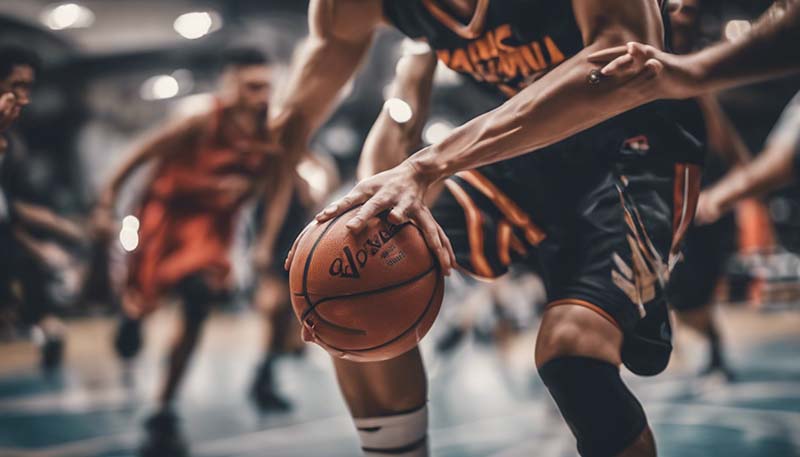Basketball Players' Nutrition: Speed and Stamina
2024-04-14
Basketball Players' Nutrition: Speed and Stamina
Basketball is a high-intensity sport that requires a combination of speed, strength, and stamina. Nutrition plays a critical role in the performance and recovery of basketball players. A well-balanced diet can provide the necessary energy and nutrients to enhance speed and endurance on the court. This article will explore the importance of nutrition for basketball players, focusing on the specific dietary requirements to improve speed and stamina.
Introduction
Basketball players need to maintain a high level of physical fitness to excel in their sport. A well-planned nutrition strategy can significantly impact their performance on the court. The primary goals of a basketball player's diet should be to provide enough energy for the intense physical demands of the game, support muscle growth and repair, and promote overall health and well-being.
The Importance of Macronutrients
Macronutrients are the primary sources of energy for the body and are essential for basketball players. The three main macronutrients are carbohydrates, proteins, and fats.
Advertisement
Carbohydrates
Carbohydrates are the body's primary source of energy. They are particularly important for basketball players because they provide the quick energy needed for sprinting and jumping. Complex carbohydrates, such as whole grains, legumes, and starchy vegetables, should make up the majority of a basketball player's carbohydrate intake. These complex carbs provide a slow, steady release of energy, which is ideal for maintaining stamina throughout a game.
Proteins
Proteins are essential for muscle growth and repair. Basketball players require a higher protein intake than the average person to support the demands of their sport. Lean sources of protein, such as chicken, turkey, fish, and legumes, should be included in a basketball player's diet. Protein also plays a role in energy production, particularly during periods of intense training or when carbohydrate stores are low.
Fats
While fats have often been vilified in the world of sports nutrition, they are an important source of energy, particularly for endurance athletes. Healthy fats, such as those found in avocados, nuts, seeds, and oily fish, provide a slow, sustained release of energy that can help basketball players maintain their stamina throughout a game. Additionally, fats play a crucial role in hormone production and overall health.
Micronutrients and Hydration
Micronutrients, including vitamins and minerals, are essential for overall health and can impact athletic performance. Basketball players should ensure they are consuming a diet rich in a variety of fruits and vegetables to meet their micronutrient needs. Hydration is also critical for basketball players, as dehydration can lead to fatigue and decreased performance. Players should aim to drink plenty of water throughout the day and during games to stay properly hydrated.
Pre-Game Nutrition
The meal consumed before a game can have a significant impact on a basketball player's performance. A pre-game meal should be high in carbohydrates and moderate in protein, with minimal fat and fiber. This will provide the necessary energy for the game without causing digestive discomfort. Consuming this meal 2-4 hours before the game allows for proper digestion and absorption of nutrients.
Post-Game Nutrition
Recovery is just as important as performance for basketball players. Consuming a meal or snack containing both protein and carbohydrates within 30 minutes to an hour after a game can help replenish energy stores and support muscle recovery. This post-game meal should be focused on high-quality protein sources and easily digestible carbohydrates, such as a protein shake with a banana or a turkey and whole-grain sandwich.
Sample Basketball Player's Meal Plan
Here is a sample meal plan for a basketball player, designed to support speed and stamina on the court:
- Breakfast: Oatmeal with berries, honey, and a scoop of protein powder
- Snack: Greek yogurt with almonds and honey
- Lunch: Grilled chicken salad with mixed greens, quinoa, and avocado dressing
- Snack: Apple slices with almond butter
- Pre-Game Meal: Whole-grain pasta with grilled turkey and marinara sauce
- Post-Game Snack: Protein shake with a banana
- Dinner: Baked salmon with sweet potato and steamed broccoli
Conclusion
Nutrition is a critical component of a basketball player's training regimen. By focusing on a well-balanced diet that includes an appropriate balance of macronutrients, micronutrients, and hydration, basketball players can enhance their speed and stamina on the court. A pre-game meal high in carbohydrates and moderate in protein, along with a post-game meal that combines protein and carbohydrates, can further support performance and recovery. With careful attention to nutrition, basketball players can optimize their physical potential and achieve their athletic goals.

Comments